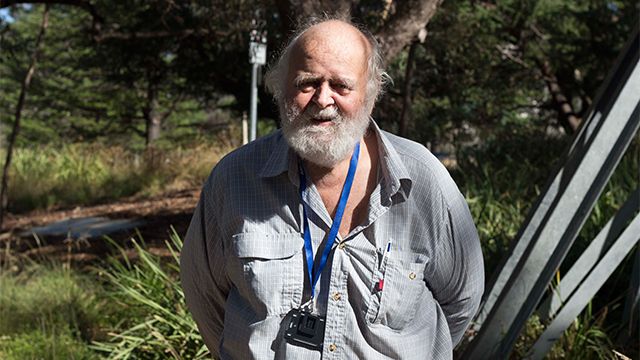From the nation’s red centre to the national university

Jeff Stead OAM.
Anthropologist and ANU Arts alumnus Jeff Stead OAM has spent his entire career working in Indigenous land rights. He was a community advisor for the Northern Territory’s former Department of Aboriginal Affairs, CEO of the Aboriginal Areas Protection Authority, and for almost 30 years a senior anthropologist with the Northern Land Council and the Central Land Council.
In the land councils, Jeff noticed something which led him to apply for a Guided Research Placement in the ANU Centre for Native Title Anthropology.
“The way [those] organisations were structured had an immense effect on how people in the organisation did their job,” Jeff explained.
The land councils’ professional areas are divided into branches: legal, anthropology, and environmentalists responsible for caring for Country.
“The effects of that is people tend to focus on their own little tasks,” Jeff said.
“They don’t focus on corporate goals. They see that they’re in competition with each other when they should be working with each other for a common thing.”
Jeff’s proposed solution is to dismantle the branch structure. In its place, he’d establish a system of teams.
“Managers wouldn’t manage branches, they’d manage projects. And the managers would have coordinating teams, so, you’d have the head of the legal branch and all the heads of the branches would come together once a week or once every couple of days,” he said.
“They’d set the priorities of what it is they’d have to do. They’d say: ‘okay, we need a team to do that’. And the best people are: an anthropologist, a lawyer, an environmental scientist. I’d get these people to sit together to work together, and their success would depend on them doing those things.”
A major factor contributing to this issue, Jeff said, is these two organisations are set up to achieve social ends. This means success and failure are difficult to measure, making inter-branch conflicts difficult to resolve.
And, he added, this problem is not limited to these organisations which are his case studies.
“They’re typical of non-profit organisations. Like hospitals and charities and non-government organisations. Organisations set up for humanitarian purposes rather than financial gain.”
They also have other characteristics.
“Hospitals are usually run by doctors. Anthropology branches are run by anthropologists. Legal branches are run by lawyers. But are they good managers? Most doctors aren’t trained as managers. [Same with anthropologists]. But yet they have to manage. So that’s a real difficulty in these organisations and one I’ll discuss.”
Jeff emphasised he believes the Northern Land Council and the Central Land Council are doing a good job.
“I’m not criticising them. I’m just trying to point out some things which would make them function more efficiently.”
Jeff’s placement with the CNTA finishes 12 February. His paper, informed by his research while at the centre, is expected to be published in June.